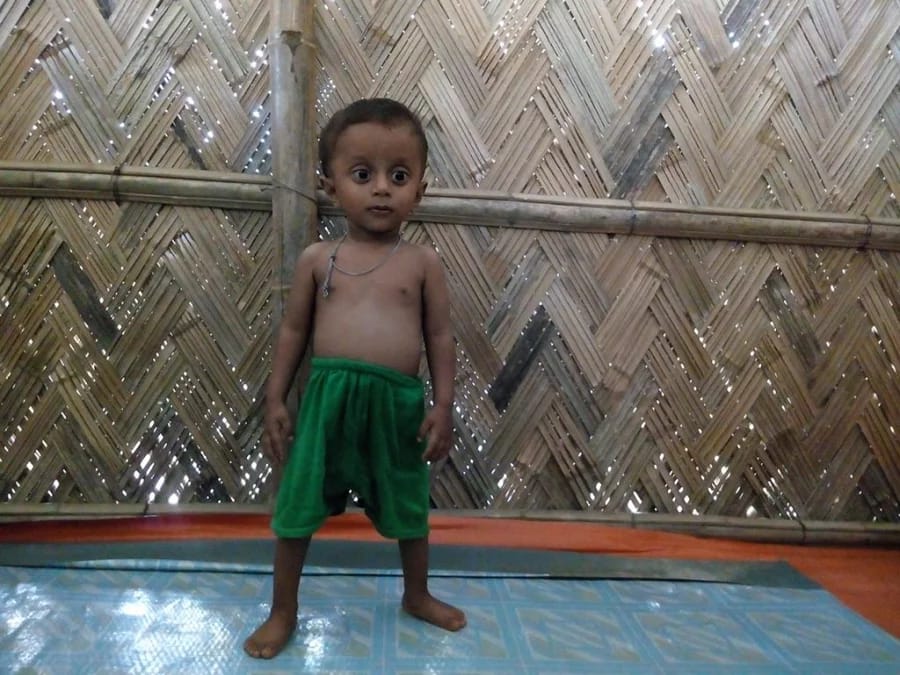For Sofura, 40, a mother of two children whose father was killed by Myanmar Millitary, life is not easy at all in the world’s largest refugee camp of Bangladesh. She has to rely on WFP ration for everything. For the whole family, she gets some rice, edible oil, salt, and sugar worth nearly 33 USD for the whole month. Hardly do they afford fish curry. Most of the time, they have meals by mixing a banana and a spoonful of sugar in the rice. The day when they can eat meat curry, their mouths become extraordinary.
There are so many Sofura in 33 camps. I can just sympathize with her family’s pain because they live close to my shelter. When fish curry is cooked in my kitchen, I am afraid that the smell would reach them.
As the holy month of Ramadan has come, many refugees become Sofura and face unbounded challenges amidst the ongoing humanitarian crisis.
One of the most critical concerns in the refugee camp is limited food. The ration that they get is not enough. They are seriously affected by malnutrition. According to the UNICEF report (Dec, 2023), over 5,7000 children under five suffer from acute malnutrition. Sajia Afrin Mesu, a nurse at the facility, said, “ around 30-35 children a day, with about 10-15 of them being diagnosed with acute malnutrition.” During Ramadan, excess to sufficient food to fast is more challenging, which results more refugees hungry and malnourished.
Even in ordinary months, refugees face shortage of foods. They try to go out of the camps in search of work, but they are detained. Last year, about a thousand Rohingya refugees were detained, assaulted, and sent back to the camps again as a result of attempting to leave the camps for work. Another about 5000, mostly from Bangladesh Camp, of which over 500 were reportedly died or gone missing, undertook a perilous journey thru fishing boats in the neighboring countries to avoid the hunger inside the camps, which UNHCR called the “deadliest year ” in the decade for Rohingya community.
Besides the foods are limited, these are not nutritious. Because the authorities restrict entering vehicles into the camp, the fish and vegetables cannot be brought whenever they are needed. By the time these can be brought, these get stale and rotten. Because of unwholesome foods, people are suffering from different kinds of diseases.

In February this year, WHO warned that people affected by humanitarian emergencies are at increased risk of noncommunicable diseases (NCDs), such as cardiovascular disease cancer chronic respiratory disease and diabetes are responsible for 75% of death worldwide. It is estimated that strokes and heart attacks are up to 3 times more likely following a disaster. During Ramadan, the unhygienic foods of the camps can also seriously exacerbate the health of the people.
Beyond physical hardship, distress and security concerns of the camp can also take an emotional toll on the Rohingya refugee during Ramadan. Many people are in nostalgia and feel homesickness, or many have lost their beloveds either in the conflict of Myanmar or in the conflict of camps based armed groups. Moreover, many people are not safe. They are no longer even interested in knowing who had been killed in the last night. The security concerns and the absence of mental stability amplify the feeling of loneliness and despair in the time of spiritual connection.
Despite all these challenges, the Rohingya show remarkable toughness and preserve their faith and traditions. In Ramadan when muslim around the world enjoy the period of fasting and prayer with delicious food and different kind of fruits, the vulnerable of the vulnerable – the Rohingya refugee – face additional challenges. International humanitarian organizations should keep an eye on the Rohingya during Ramadan, providing essential food aid, medical assistance, and psychosocial support services. However, much more needs to be done to resolve underlying issues and mitigate the suffering of the Rohingya community.
More importantly, It is coming up to fifty years of this protracted suffering. The world should not be content to see this level of suffering. Long-term solutions to address the root causes of the Rohingya crisis are crucial, and Myanmar Junta must extensively be pressured by the international community. We Rohingya are looking forward to the demise of this hated regime and a return to Arakan with rights and citizenship restored as soon as possible in order to live in peace and security, free from persecution and discrimination in Rakhine State, Myanmar.
Author Bio: Pacifist Farooq is a Rohingya refugee, co-founder of RUWED, activist poet and teacher living in the world’s largest refugee camp of Cox’s Bazar, Bangladesh.
* This represents the writer’s own opinion only it doesn’t necessarily reflect organizational stance.*
More Stories
Bangladesh Urges UN to Act on Rohingya Crisis
As the international community grapples with worsening instability in Myanmar, Bangladesh has issued a renewed diplomatic call for global action...
Bradford to Establish UK’s Rohingya Memorial
Bradford, UK – In a historic move, Bradford is set to become the first city in the UK to establish...
Alarming Security Concerns for Bangladesh Amid Arakan’s Continued Unrest
Introduction Since its independence, Burma (Myanmar) has been plagued by instability and ethnic conflicts, particularly in the Arakan (Rakhine) state,...
AA Accused of Forcibly Seizing Rohingya in Arakan
For generations, the Rohingya families of Pyite (Moo) village have lived peacefully in their homes, building lives on land legally...
PM Anwar-Dr. Yunus Spark Hope for Rohingya Rights and Dignity
As Nobel Laureate Dr. Yunus steps into leadership in Bangladesh, a ripple of hopeful anticipation reaches Malaysia, where thousands of...
The Missing Piece in the Rohingya Crisis
The Rohingya Muslim crisis is one of the most severe humanitarian catastrophes in modern times. This marginalized community endures brutal,...